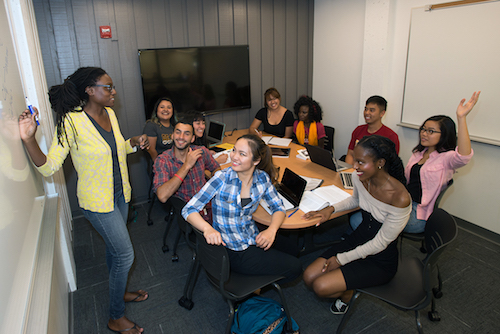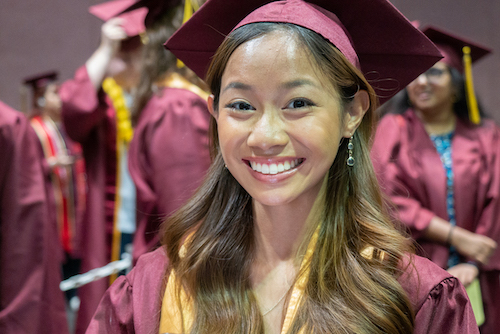Student-Centered Instruction


The college profile includes these sections
- An Unparalleled Opportunity
- Educational Excellence
- Student-Centered Instruction
- Equity and Social Justice
- A Beautiful and Vibrant Campus
De Anza College is an institution – and community – dedicated to providing innovative and effective instructional programs in a welcoming and supportive environment.
The college uses evidence-based best practices and a data-driven approach to planning, evaluating programs and allocating both financial and human resources. Every five years, through a shared governance process, De Anza develops an Educational Master Plan that includes institutional metrics for measuring progress on clearly defined goals for student success, including course completion, retention, transfer, equity, civic engagement and other priorities.
 De Anza also uses its annual review process and strategic planning – through the Educational Master Plan as well as the Student Equity and Achievement Plan – to address equity goals and measure progress in reducing disproportionate rates
of enrollment, retention, course completion and other metrics.
De Anza also uses its annual review process and strategic planning – through the Educational Master Plan as well as the Student Equity and Achievement Plan – to address equity goals and measure progress in reducing disproportionate rates
of enrollment, retention, course completion and other metrics.
A key value, inherent in all of De Anza’s planning efforts and instructional programs, is a campuswide commitment to student equity, including the closing of achievement gaps seen historically in lower success rates for African American, Latinx, Filipinx and Pacific Islander students.
Departments use an online data tool to examine their students’ success rates by ethnicity, gender and other characteristics, including enrollment in special programs such as those serving students with disabilities or low incomes. Individual faculty members also have access to similar data for their own course sections, so they can see how their students’ outcomes compare with those for other groups and course sections, and identify any gaps to address.
Along with equity and accountability, De Anza has fostered an environment that encourages new and innovative approaches to instruction.
One example is the Vasconcellos Institute for Democracy in Action (VIDA), which promotes civic engagement by coordinating “engaged learning” opportunities for students to gain real-world experience with a variety of nonprofit organizations and campaigns. VIDA also offers a certificate of achievement in Leadership and Social Change and an associate degree for transfer in Social Justice Studies.
Other examples include the pioneering Math Performance Success (MPS) program, described in the previous section, and the new MESA (Math, Engineering and Science Achievement) program. These provide extra instructional time, counselors and tutors in the classroom to assist students.
Students in De Anza’s Learning Communities take classes together as a cohort and join social and academic activities, including visits to potential transfer universities, with guidance from an academic counselor assigned to the program. Several Learning Communities are geared to support historically underserved populations, including Black, Latinx and Filipinx or Southeast Asian students. Others have been established to support LGBTQ+ students, foster youth and students who were previously incarcerated.
On a larger scale, De Anza’s six Villages offer similar opportunities for all students to join a community of peers while participating in activities with instructors, counselors and staff members who share their academic interests. The Villages contact students regularly with invitations to participate in activities or meet with an instructor or counselor during office hours at their Village Center – a designated space on campus.
De Anza also offers extensive academic support to all students, both face-to-face and online, through its Student Success Center. Support services include peer-led individual, drop-in and group tutoring. In addition, workshops are offered on student life, study skills, reading, writing and grammar, along with specific academic subjects such as math, science and business.
The college has moved to address another challenge faced by many students – the high cost of textbooks – through the faculty-led adoption of free and low-cost textbooks and other course materials. During each registration period, students are encouraged to check the course listings for an easily recognizable symbol that indicates whether course materials are free or low-cost.

